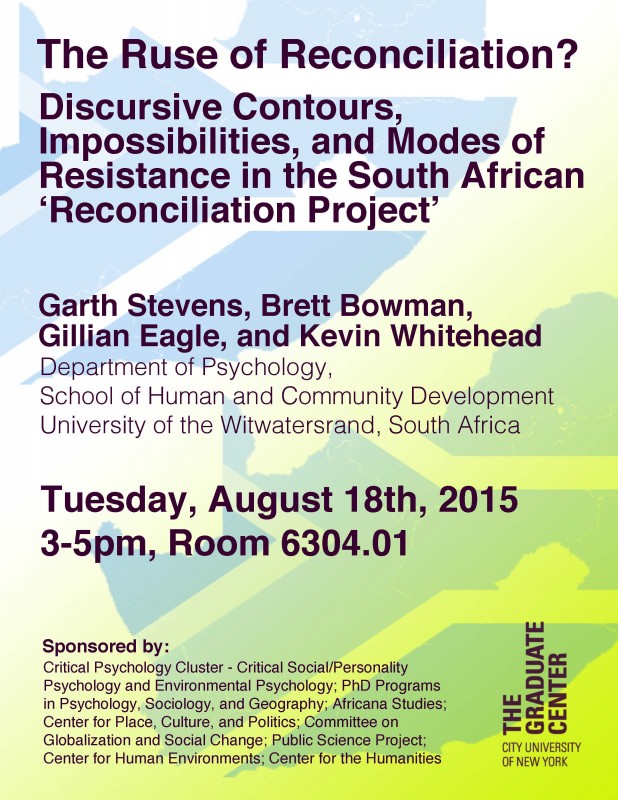Please join Garth Stevens, Brett Bowman, Gillian Eagle, & Kevin Whitehead, from the Department of Psychology, School of Human and Community Development, University of the Witwatersrand, South Africa for a symposium on Tuesday, August 18th, 2015, 3:00-5:00 pm, Room 6304.01 (Psychology).
The Ruse of Reconciliation?
Discursive Contours, Impossibilities, and Modes of Resistance
in the South African ‘Reconciliation Project’
In this symposium we interrogate the ‘reconciliation project’ in South Africa that has become embedded in the trope of the exceptional miracle and highlight the prospects and problematics of reconciliation. The symposium addresses three related arguments. We first explore forgiveness and reconciliation as a fluid discourse that has served varied socio-political functions across historical periods. Second, we examine the limitations of forgiveness and its circular impossibility, as the injunction to forgive calls on us to forgive that which is unforgiveable in the Derridean sense. Third, we argue that in the absence of social repair and with growing inequality, the historical and collective trauma of apartheid violence is drawn upon as a psychological and socio-political resource. The symposium concludes with a commentary on reconciliation as a discourse that is implicated in the constitution of relations of power, both at the level of its reproduction and resistance in South African life.
Garth Stevens is a Full Professor and Clinical Psychologist in the Department of Psychology, School of Human and Community Development, at the University of the Witwatersrand in South Africa. His research focuses on race, racism and related social asymmetries; critical psychology, ideology, power and discourse; violence and its prevention; and historical/collective trauma and memory. He has published widely in these areas, including Race, memory and the apartheid archive: Towards a transformative psychosocial praxis (Palgrave Macmillan, 2013).
Brett Bowman is an Associate Professor in the Department of Psychology, School of Human and Community Development, at the University of the Witwatersrand in South Africa. His research is on the intersections of violence and social asymmetries in low-middle income countries. His current research examines how risks for violence translate into its enactments. He has published widely and contributed to the World Bank’s Diseases and mortality in Sub-Saharan Africa: Violence prevention in low- and middle income countries and the World Health Organization’s Violence and health in the WHO African region.
Gillian Eagle is a Full Professor of Psychology in the School of Human and Community Development at the University of the Witwatersrand in South Africa, and a Clinical Psychologist. She conducts research on socio-cultural, historical and political aspects of trauma and violence, focusing on the inter-relationship between the socio-political and intra-individual domains of human experience. Her 2010 co-authored book, Traumatic stress in South Africa, has re-invigorated the construct, continuous traumatic stress, and she co-edited a 2013 special issue of Peace and Conflict: The Journal of Peace Psychology on this topic.
Kevin Whitehead is an Associate Professor in the Department of Psychology, School of Human and Community Development, at the University of the Witwatersrand in South Africa. His current research involves applying ethnomethodological and conversation analytic approaches to embodied action-in-interaction in order to examine how violent encounters unfold in situ. He has published methodological and empirical research articles in a range of international journals including Social Psychology Quarterly, British Journal of Social Psychology, Research on Language and Social Interaction, Discourse& Society, and Ethnic and Racial Studies, amongst many others.
Co-Sponsors: Critical Psychology Cluster (PhD Programs in Critical Social/Personality Psychology and Environmental Psychology); PhD Programs in Psychology, Sociology, and Geography; Africana Studies; The Center for Place, Culture, and Politics; Committee on Globalization and Social Change; The Public Science Project; The Center for Human Environments; and The Center for the Humanities
This event is free and open to the public



